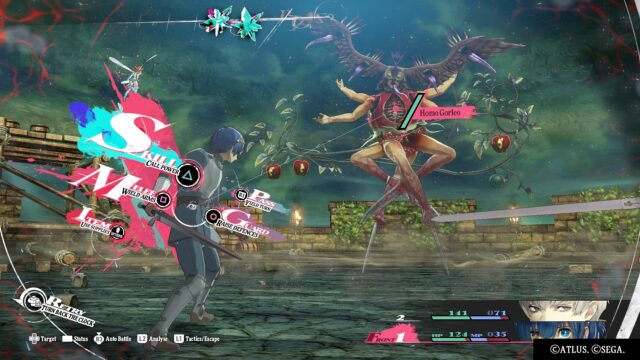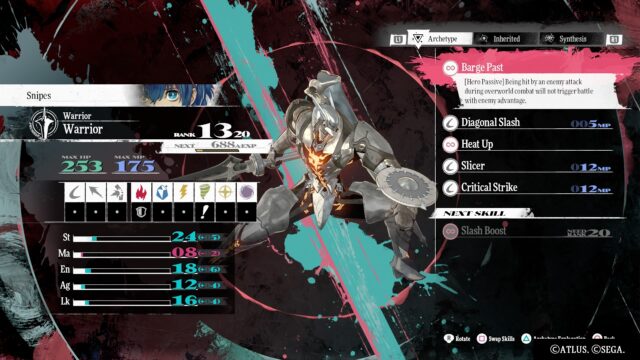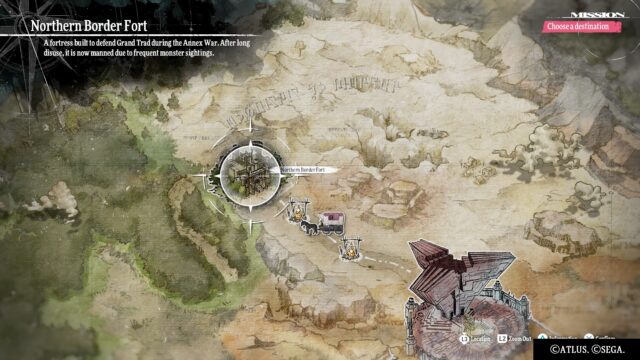Editor-in-Chief’s note: While full reviews for Metaphor: ReFantazio are available elsewhere at the time of posting, due to certain circumstances RPGamer’s review will not be ready for a few weeks. In the meantime, we have decided to offer our readers some thoughts on the substantial prologue demo currently available.
From what’s available in the demo, Metaphor: ReFantazio promises an intriguing story, numerous customisation options, and a mesmerising soundtrack.
A couple of weeks ago, Atlus treated JRPG lovers to a demo of its upcoming title Metaphor: ReFantazio. The demo, available for PC, PlayStation 4, PlayStation 5, and Xbox Series X|S, lets players experience the prologue of the full game. It gives a glimpse of the story’s epic scope and features five dungeons showing the potential of its battle system. From the time spent on the demo, it feels like the game’s long development time was worth the wait.
Metaphor: ReFantazio is set in the fantasy realm of Euchronia, which is facing great turmoil due to the king’s death and the threat posed by powerful monsters known as Humans. It sees a young man, whose name is chosen by the player, and his fairy companion Gallica setting out on a perilous journey to save the prince of Euchronia from a deadly curse. The duo ends up involved in a political conspiracy, with the popular military genius Louis Guiabern — who conducted the king’s assassination and is the prime suspect for the prince’s curse — as their likely archenemy. As major figures of Euchronia are gathered for the king’s funeral, a special spell said to be the late king’s doing is cast, enforcing a magic election to determine the next ruler. The protagonist takes part in the election to prevent Louis from claiming the throne and restore his friend, the prince, as heir of the crown.
The first hours of Metaphor: ReFantazio brilliantly depict a kingdom facing a dire crisis, where the ones in power scheme to retain their privileges, the common people voice their insecurity, a civil war could break out, and rival nations threaten to invade. All these points, cleverly presented through the demo, contribute to putting the player in the shoes of someone journeying through the tormented kingdom of Euchronia. Beyond successfully replicating the state of a country on the brink of chaos, the prologue shows how injustice comes to be and is nurtured by various factions to further their own agenda. While the protagonist has to fight this injustice, the prologue hints at the unlikelihood for a single individual to change the fate of a nation all by themself. Thus, the protagonist must gain the support and trust of key individuals, known as Followers, to succeed in his quest to save both the kingdom and the prince. With this approach, the game displays a great potential to tell a heartfelt story about bonds and friendship, while taking players across the vast kingdom.

The protagonist and Gallica, two partners in crime!
Players are able to engage regular enemies in real-time and turn-based combat. In real-time combat, players can move freely, attack with the equipped weapon, lock onto a particular enemy, and dodge attacks. Whenever the player is three levels higher than a foe, they can defeat them through the real-time combat alone. Otherwise, the real-time combat allows them to stun their enemies after striking them enough. At this point, in case players initiate the turn-based system, they start with the advantage of facing weakened foes who won’t be able to move for an entire turn. Meanwhile, if the player gets hit by a strong enemy, the player is forced into the turn-based battle, where they will be on the receiving end for one turn. On the other hand, players, who aren’t confident in their ability to stun enemies in real-time combat, can directly initiate the turn-based battle from a safe distance, starting the fight with no advantage or handicap. The two systems pair well with each other, rewarding those skilled for action-based battles without punishing those who prefer the turn-based approach. In addition, it is convenient to be able to dispatch weak enemies with the real-time combat, instead of facing them in a slower turn-based confrontation the player is sure to win.
While the real-time combat of Metaphor: ReFantazio is decent and effective, the turn-based system remains the primary way to deal with enemies, especially the stronger ones and bosses. During turn-based battles, the number of actions available to players and enemies are represented by icons. Striking the foe’s weakness or scoring critical hits depletes only half of an icon, while missing a target or hitting the opponent with an element they are especially strong against costs two icons or more. Synthesis skills, which require specific party composition and skills, also consume more than one icon but make up for this cost with greater effects, such as hitting all enemies at once, dealing tremendous damage, or providing a buff to the entire party. As a result, players must be wary of how they manage the number of actions at their disposal, while paying attention to their elemental affinity and the enemies’ if they wish to perform more actions while limiting the number of actions their opponent can muster.

The Human in this picture is the four-legged one.
The strategic aspect of combat makes vanquishing otherwise stronger opponents possible and pushes players to not always rely on the same party composition. By keeping players on their toes, the demo ensures that battles remain fun and makes one wonder which interesting tools will be available in the full release. Although the highest difficulty setting, Regicide, was inaccessible during the demo, the Hard mode that grants most enemies an additional turn proved very challenging.
Through the game, the protagonist and his allies awaken to the power of Archetypes, which are embodiments of heroic figures of the past that take on the role of classes. Each Archetype comes with its own stat distribution and skills, defining the role it is best suited for during turn-based combat. For example, with his high strength and endurance, the Warrior Archetype is meant to take the front row where he can deal great damage with melee attacks. The Mage Archetype, with his low defense and high magic, does better on the back row where his offensive spells don’t lose too much of their potency. In addition, the Archetype wielded by the protagonist determines which weapon he uses in real-time combat. For instance, the Mage Archetype grants him the ability to strike many enemies simultaneously at mid-range, while the Warrior Archetype allows him to perform slow but powerful combos that are assured to stun enemies whenever they connect.
There are benefits both in opting for a balanced party and a team made essentially of the same Archetype thanks to the variety of Synthesis skills available. For example, while a team comprised of the Seeker, Knight, and Healer Archetypes has access to support affecting the whole party, a team made of three Warrior Archetypes can unleash a devastating slash attack even some bosses can’t survive with the right set up. The demo confirms the ability for the protagonist and his allies to learn any Archetype unlocked by any character and pass down skills learned from an Archetype under certain conditions. These possibilities give players a lot of freedom regarding their party composition and how they want to build a specific character.

A slash from the Warrior Archetype is incredibly powerful.
The first hours of demo proved very restrictive regarding the ability for players to manage their schedule. However, the restrictions were necessary to correctly set up the main story. Thus, after a major development, the game lets players decide how they want to handle the main mission at hand. In fact, major incidents or crisis occur on specific dates of the calendar, prompting the protagonist and his allies to solve the situation before a given deadline. Meanwhile, players are free to take part in various activities that may increase their popularity, win over new Followers, or raise their Royal Virtues, which represent various aspects the protagonist’s personality such as his eloquence, wisdom, and courage. In the demo, improving a particular Royal Virtue proved necessary to accept a quest, where players must journey to a dungeon inhabited by strong monsters. This likely hints at the importance of the Royal Virtues in the full release as well as some emphasis on traveling from a location to another.
The graphics featured in Metaphor: ReFantazio rely more on the uniqueness of the art style than their graphical fidelity. The game’s anime-esque aesthetic does well in immersing players into a medieval setting and the gorgeous cinematics, placed at key moments of the adventure, add to the wonder of the journey. During the demo, the non-playable character models seen in Grand Trad, the capital of Euchronia, are varied enough to give the impression one is visiting a bustling city inhabited by thousands of individuals. The characters’ 2D portraits are so stunning and expressive they make up for the 3D facial expressions that aren’t very accurate in some instances. Battle animations are impressive, especially for synthesis skills. The game’s distinctive art style also contributes to reinforcing the horrific nature of monsters and Humans, which are generally creatures as hideous as they are powerful.

May the full release keep its promise of wonderful travels.
On the musical front, the demo offers a repertoire that combines orchestra and Esperanto lyrics, which gives a strong folkloric feel that goes well with the medieval ambience. The main battle theme seems to have some longevity, invigorating players with its spirited lyrics. The voice acting is of excellent quality. Whenever dialogs are voiced, the actors accurately convey the emotions seen on the screen. Thanks to their wonderful performances, various characters with different accents come to life. There is a clear contrast between how the knight Hulkenberg expresses herself and the crude way the bounty hunter Catherina speaks her mind, as to show both characters are clearly from different births.
It’s clear from the demo that Metaphor: ReFantazio combines many of the best features seen in other Atlus games. Despite borrowing elements from other Atlus titles, Metaphor has a very distinctive feel thanks to its medieval setting and its emphasis on political conspiracies and travel. From what’s available in the demo, Metaphor: ReFantazio promises an intriguing story, numerous customisation options, and a mesmerising soundtrack.
The post Metaphor: ReFantazio Demo Impression appeared first on RPGamer.
